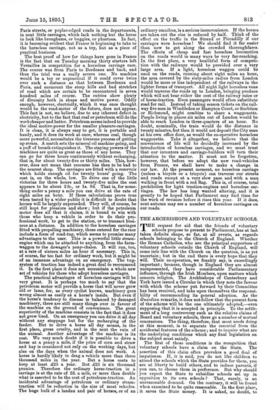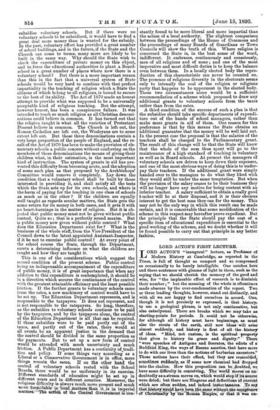THE ARCHBISHOPS AND VOLUNTARY SCHOOLS. T HE request for aid that
the friends of voluntary schools propose to present to Parliament, has at last taken definite shape, so far, at all events, as regards schools belonging to the Church of England. Whether the Roman Catholics, who are the principal supporters of voluntary schools outside the Church of England, will come into line with the Church on the question, is as yet uncertain ; but in the end there is every hope that they will. Their co-operation, we frankly say, is exceedingly important ; because, though in England they are almost unrepresented, they have considerable Parliamentary influence, through the Irish Members, upon matters which concern religion. The Archbishops of Canterbury and York have issued a Circular in which they note the favour with which the scheme put forward by their Committee has been received, and take upon themselves the responsi- bility of recommending its general adoption. As the Guardian remarks, it does not follow that the present form of the scheme will be the one ultimately adopted,—even supposing that it is accepted in principle. To the settle- ment of a long controversy such as the relative claims of Board and voluntary schools, there go a number of mutual concessions. The thing, therefore, that most needs doing at this moment, is to separate the essential from the accidental features of the scheme ; and to inquire what are the underlying conditions which any final legislation on the subject must satisfy. The first of these conditions is the recognition that voluntary schools have a claim on the State. The assertion of this claim often provokes a good deal of impatience. If, it is said, you do not like children to attend the schools which the State provides for them, you are at liberty to build others, and to induce parents, if you can, to choose them in preference. But why should you expect the State to subsidise schools set up in opposition to its own schools ? That, surely, is an unreasonable demand. On the contrary, it will be found when examined to be quite reasonable. In the first place, it saves the State money. It is asked, no doubt. to subsidise voluntary schools. But if there were no voluntary schools to be subsidised, it would have to find a great deal more money than is wanted for the subsidy. In the past, voluntary effort has provided a great number of school buildings, and in the future, if the State and the Church can come to terms, many more are likely to be built in the same way. Why should the State wish to cheek the expenditure of private money on this object, and to force the educational authorities to plant a, Board- school in a, great number of places where now there is a voluntary school ? But there is a more important reason than this in the fact that a universal system of State schools would be very hard to combine with that perfect impartiality in the teaching of religion which a State the citizens of which belong to all religions, is bound to secure to the best of its ability. The Act of 1870 made an honest attempt to provide what was supposed to be a universally acceptable kind of religious teaching. But the attempt, however honest, has been a conspicuous failure. It was intended to teach so much religion as all Christian denomi- nations could believe in common. It has turned out that the religion taught is what all the varieties of Protestant Dissent believe in common. The Church is left out, the Roman Catholics are left out, the Wesleyans are to some extent left out. But these three denominations contain a very large proportion of the people of England, and the re- sult of the Act of 1870 has been to make the provision of ele- mentary schools a public concern without conferring on the members of these denominations the means of giving their children what, in their estimation, is the most important kind of instruction. The system of grants in aid has pre- vented this difficulty from becoming acute, and the adoption of some such plan as that proposed by the Archbishops' Committee would remove it completely. Lay down the condition that a voluntary school shall be built by those interested in providing it, and shall satisfy all the tests which the State sets up for its own schools, and where is the harm of paying for the teaching in one class of schools as much as in the other ? If the children are equally well taught as regards secular matters, the State gets the same return for its money in both cases, and it gets it with no heart-burnings in the matter of religion. But it is ob- jected that public money must not be given without public control. Quite so ; that is a perfectly sound maxim. But is public money now given without public control ? What does the Education Department exist for ? What is the business of the whole staff, from the Vice-President of the Council down to the latest appointed Assistant-Inspector, if it be not to exercise public control ? At every point of the school course the State, through the Department, exerts a determining influence on what the children are taught and how they are taught it.
This is one of the considerations which suggest the second condition of the present scheme. Public control being an indispensable accompaniment of the expenditure of public money, it is of great importance that when any addition to this expenditure is contemplated, it should be in a direction which secures the continuance of the control with the greatest attainable efficiency and the least possible friction. If the further grants to voluntary schools came from the rates, a new machinery of control would have to be set up. The Education Department represents, and is responsible to the taxpayers. It does not represent, and is not responsible to the ratepayers. So long, therefore, as the subsidies to voluntary schools continue to be paid by the taxpayers, and by the taxpayers alone, the control of the Education Department is all that can be required. If these subsidies were to be paid partly out of the taxes, and partly out of the rates, there would at all events be an apparent justice in the demand that the control should be divided in the same proportion as the payments. But to set up a new form of control would be attended with much uncertainty and much friction. A Public Department has a continuity of Jradi- tion and policy. If some things vary according as a Liberal or a Conservative Government is in office, more things remain the same. If on the other hand the control of voluntary schools rested with the School Boards, there would be no uniformity in its exercise. Different standards of education might be set up in different years and in different counties. Moreover, the religious difficulty is always much more present and much more forntidable *local inatters than it is in imperial matterti.--athe settOii of the Central Government is 'cell- stantly found to be more liberal and more impartial than the action of a local authority. The slightest comparison between the proceedings of the House of Commons and the proceedings of many Boards of Guardians or Town Councils will show the truth of this. Where religion is concerned the State is, in the best sense of the word, indifferent. It embraces, continuously and consciously, men of all religions and of none ; and one of the most imperative and most difficult duties is to keep the balance even between them. In a locally elected body the repro- duction of this characteristic can never be counted on. The presence of religious diversity in the electorate seems only to intensify the zeal of the religion or religious party that happens to be uppermost in the elected body. These two circumstances alone would be a sufficient recommendation of a scheme which proposed to draw any additional grants to voluntary schools from the taxes rather than from the rates.
A third condition of the success of such a plan is that the subsidies should take specific departments of expendi- ture out of the hands of school managers, rather than make more grants in aid of them. One reason for this preference is that by this means the State obtains an additional guarantee that the money will be well laid out. In the present case the proposal is that the salaries of the teachers shall be charged to the Parliamentary grant. The result of this change will be that the State will know that the whole of the sum thus spent will go to the maintenance of a high standard of teaching in voluntary as well as in Board schools. At present the managers of voluntary schools are driven to keep down their expenses, and one of the most obvious ways of doing this is to under- pay their teachers. If the additional grant were simply handed over to the managers to do what they liked with they would still be under the same temptation. But when the provision of the salary ceases to be their business they will no longer have any motive for being content with an inferior teacher. A salary sufficient to obtain a really good teacher will be at their disposal, and it is their obvious interest to get the best man they can for the money. This may not be the only way in which this result can be made certain, and it is conceivable that some modification of the scheme in this respect may hereafter prove expedient. But the principle that the State should pay the cost of a specific item of educational expenditure is essential to the good working of the scheme, and we doubt whether it will be found possible to carry out that principle in any better fashion.



































 Previous page
Previous page